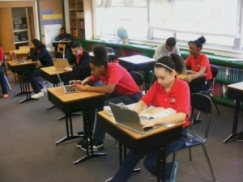
The Course of Studies Offered at St. Philip’s Lutheran School
Word of God – Each day classes will study God’s word to heighten the students’ awareness of their great God. The study of God’s Word will provide them the opportunity to grow in and with the Word focusing on the Old Testament and New Testament. Old Testament studies will reflect the constant promise of the Savior given to the Old Testament prophets and patriarchs. New Testament studies will include the public ministry of Christ, his suffering, his death and his resurrection. It will also include a study of the early Christian church on earth.
Fine Arts – Children will be offered experiences in art and music throughout the curriculum. Both music and art will reflect the rich traditions and heritage of the community St. Philip’s Lutheran School serves. Students will be given the opportunity to express themselves through a variety of mediums and techniques. Various fairs (art, science, and history) will be held at the culmination of every year to recognize high achievement in these areas.
Mathematics – The mathematics curriculum will focus on computation and conceptual disciplines. A student must demonstrate a level of mastery in their studies before passing to the next level. The study of math will begin with basic concepts of numeration and progress up to the methods and structure of Algebra. Students who fall behind in their daily math assessments may be required to remain after school on a daily basis until they demonstrate mastery of specific skills and concepts.
Reading/Literature Courses – The skill of reading is rooted in teaching proficiency in phonics. The curriculum will offer students many activities in phonics and will work to expand the student’s base vocabulary by exposing them to many different types of literature. Reading is closely linked to the writing process. Writing activities are an integral part of any curriculum. Writing activities will permeate the curriculum throughout all courses and subjects. The reading curriculum will also include children’s literature with a focus on the classics and great African American writers. Assessment on decoding skills are done daily.
Students who fall behind in their daily reading assessments may be required to remain after school on a daily basis until they demonstrate mastery of specific skills and concepts.
Spelling – Spelling is taught at all grade levels. At the primary grade levels spelling and phonics are individual classes. This is done to maximize the student’s familiarity with the ability to read phonetically. In the intermediate and upper grade levels the spelling course serves as a phonics course while working to expand the vocabulary base of the students at the appropriate grade level.
Science – At the primary level science is a tool used to create awareness of how wonderful God has designed our world. Conceptual science begins at the intermediate grade level. At the middle and upper grade levels the science course will alternate from physical science to life science. The upper grades will receive a course designed to outline those major concepts that students will need to be successful in high school.
Social Studies/History – History content at the primary grade levels is designed to create an awareness of the community in which the students live and how that community functions and works together as a whole. The course of studies at the intermediate level will focus on introductory concepts in geography. In addition, intermediate grades will study Wisconsin history, middle grades and upper grade students will study American and World History.
|
|
|
|